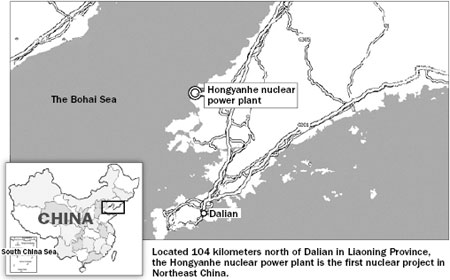


On the shore of the Bohai Sea construction has begun on the Hongyanhe generating facility that will
become the first base for nuclear power generation in the north of the country.
Located 104 kms north of Dalian in Liaoning Province, the first phase of the project will require an investment of 48.6 billion yuan and have four generating units, the first of which is expected begin operation in 2012. It will be joined by the other three units in 2014.
Liaoning Hongyanhe Nuclear Power Co Ltd is in charge of the construction and operation of the project. China Guangdong Nuclear Power Holding Co Ltd (CGNPC) and China Power Investment Corp each hold a 45 percent share of the company, while the Dalian Municipal Construction Investment Co holds the remaining 10 percent.
The Hongyanhe project will help meet the increasing power demand in northeast China, where the economy has been boosted by the country's strategy of revitalizing the region, Li Zhiyuan, a spokesman with CGNPC tells China Business Weekly.
Once the four units are operational, the nuclear plant will generate 30 billion kilowatt-hours of electricity a year. Last year the city of Dalian consumed around 13 billion kilowatt-hours of electricity, says Xu Juncai, vice general manager of Liaoning Hongyanhe Nuclear Power Co Ltd.
"The Hongyanhe nuclear power plant will become the nuclear power base for Northeast China. It will also boost the nuclear power equipment manufacturing industry in the region," says Xu.
"As a clean energy, the plant will also greatly improve the energy structure in the region," he says. Statistics show that the current total installed power capacity in Northeast China is 30 gigawatts, with thermal power accounting for around 85.2 percent.
Indigenous technology
The Hongyanhe nuclear power plant will use CPR1000 pressurized water reactor (PWR) technology based on technology of French nuclear company Areva along with significant innovations and modifications.
The Areva technology was first used at Daya Bay, CGNPC's first nuclear power plant in the nation. With two 984-megawatt PWRs, the company constructed and operates the project under the principles of "introduce, digest, absorb and innovate", says Li, the spokesman with CGNPC.
Following the Daya Bay facility, CGNPC in 1997 began construction of the Ling Ao nuclear power plant phase I. Comprised of two PWRs of 990 megawatts each, Ling Ao phase I took the Daya Bay project as a model because of its 52 significant improvements, says Li.
"We have achieved indigenous capability in project management, construction, installation, commissioning and operation preparation. Domestically made equipment accounts for 30 percent in the Ling Ao phase I project," he says.
The company in 2005 started construction of the main building at Ling Ao phase II, which will have two CPR1000 units. To improve safety and economy at the plant, 15 important technical improvements and more than 40 other improvements have been implemented, including digital control systems, an advanced control room and half-speed turbine. The proportion of domestically made equipment is 50 percent for phase I and 70 percent for phase II .
And the ratio is growing."Domestically made equipment will account for 85 percent in the Hongyanhe project," says Li.
"From Daya Bay to the Hongyanhe project, we have fully realized Indigenous development of the CPR 1000 technology. We have also trained a large team of professionals experienced in the technology," he says.
Under CGNPC, the Daya Bay and Ling Ao projects have formed a nuclear generating powerhouse in Guangdong Province, an important contribution to the nation's 11 nuclear reactors in operation. All in current use employ first- or second-generation technology.
Many of the existing nuclear plants use technology from foreign countries. The Qinshan phase III plant imported two Canadian 700-megawatt heavy water reactors and the Tianwan plant uses PWRs supplied by Russia.
Earlier this year China finalized a contract with United States-based Westinghouse Electric to use the company's AP1000 technology to build four third-generation nuclear reactors, two in Sanmen in the Zhejiang Province, and two in Haiyang in Shandong Province.
Like CGNPC, Chinese power companies have increased efforts on the indigenous development of their own nuclear technology. After the nation independently developed the first 300-megawatt PWR, which is in use at the Qinshan facility, its first nuclear power plant, China National Nuclear Corp (CNNC), the nation's largest nuclear power company, developed CNP600 and CNP1000 PWR technology.
CNP1000 technology will be used at the Fangjiashan project, not far from the Qinshan site in East China's Zhejiang Province.
Last year China Huaneng Group, the nation's largest power company, also began construction of its first nuclear plant using high temperature gas-cooled reactors.
Its Shidaowan plant in Rongcheng, East China's Shandong Province, will have an installed capacity of 200 megawatts and require an investment of 3 billion yuan. Seventy percent of the technology used in the project will be developed by China.
Huaneng has signed an agreement with China Nuclear Engineering & Construction (Group) Corp and Tsinghua University to establish a new company to operate the plant.
(China Daily 09/03/2007 page3)













